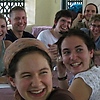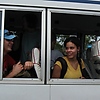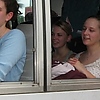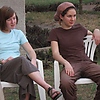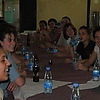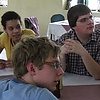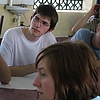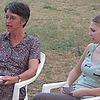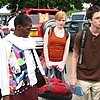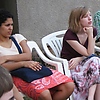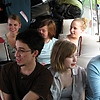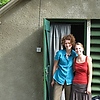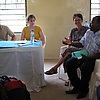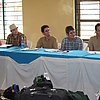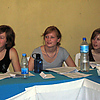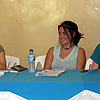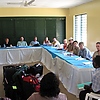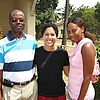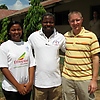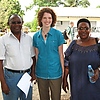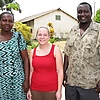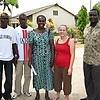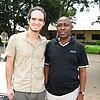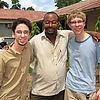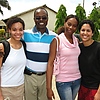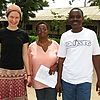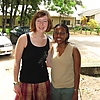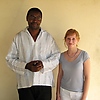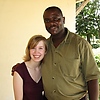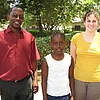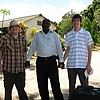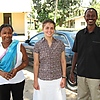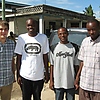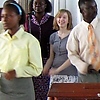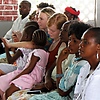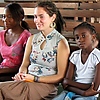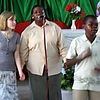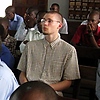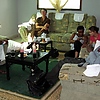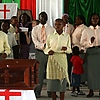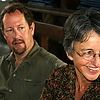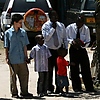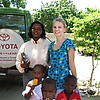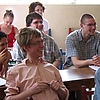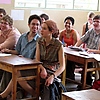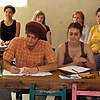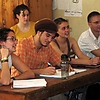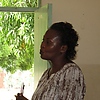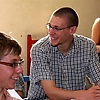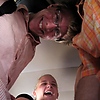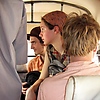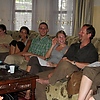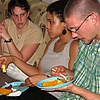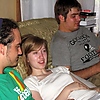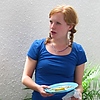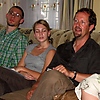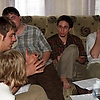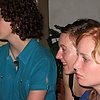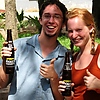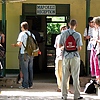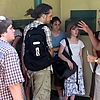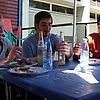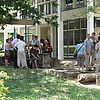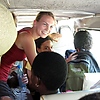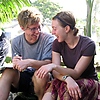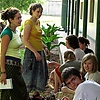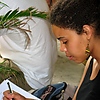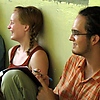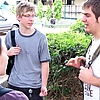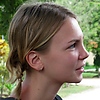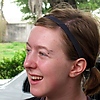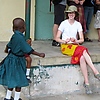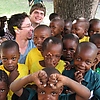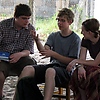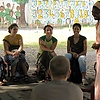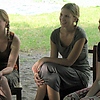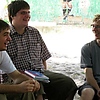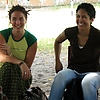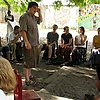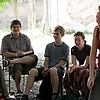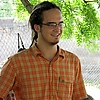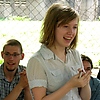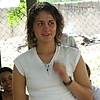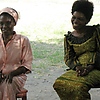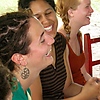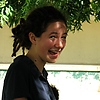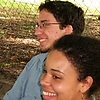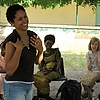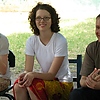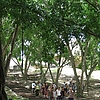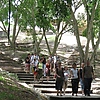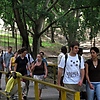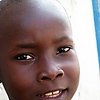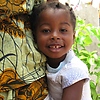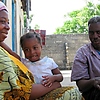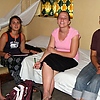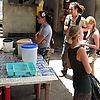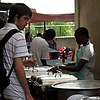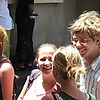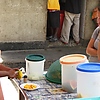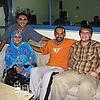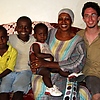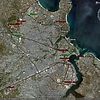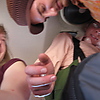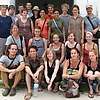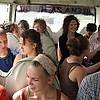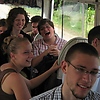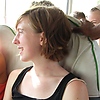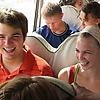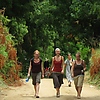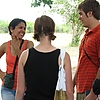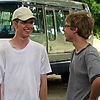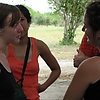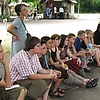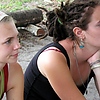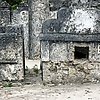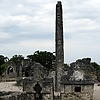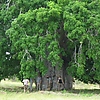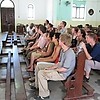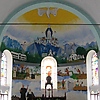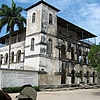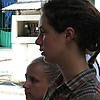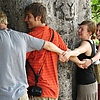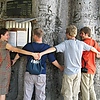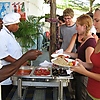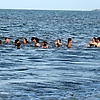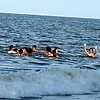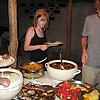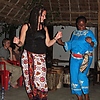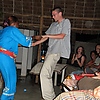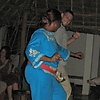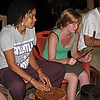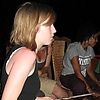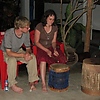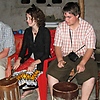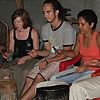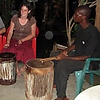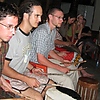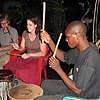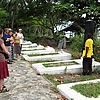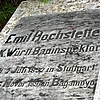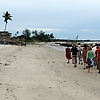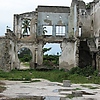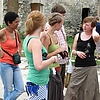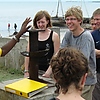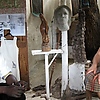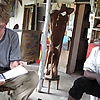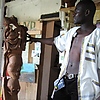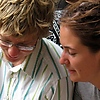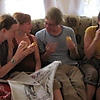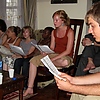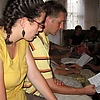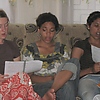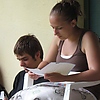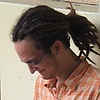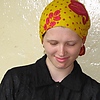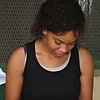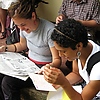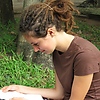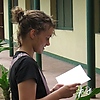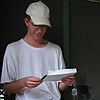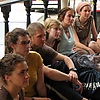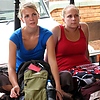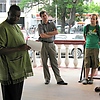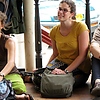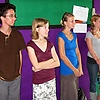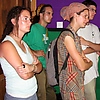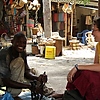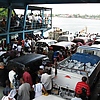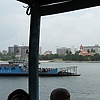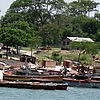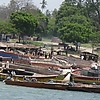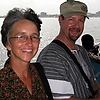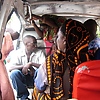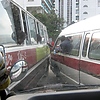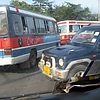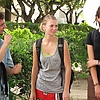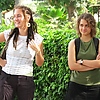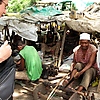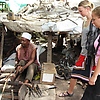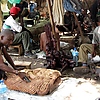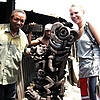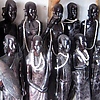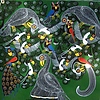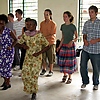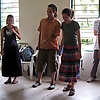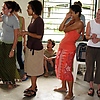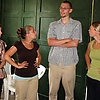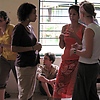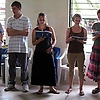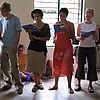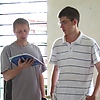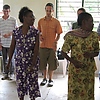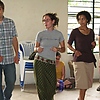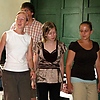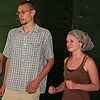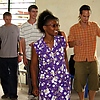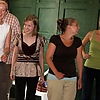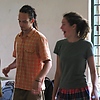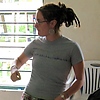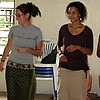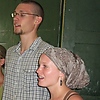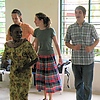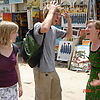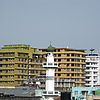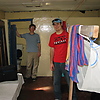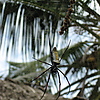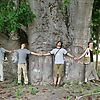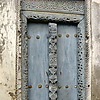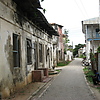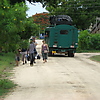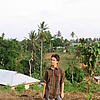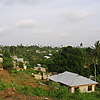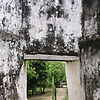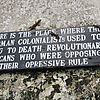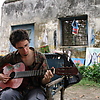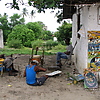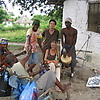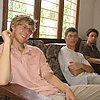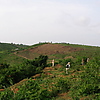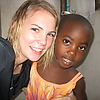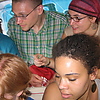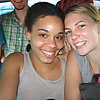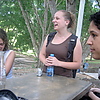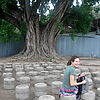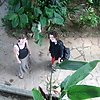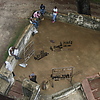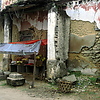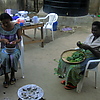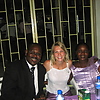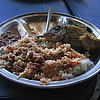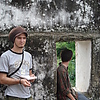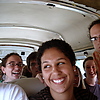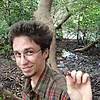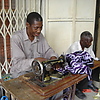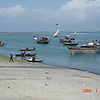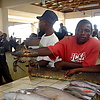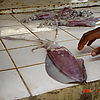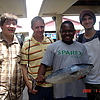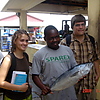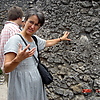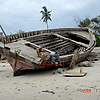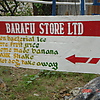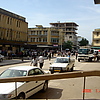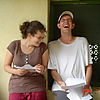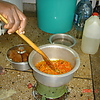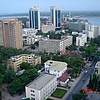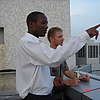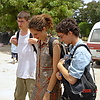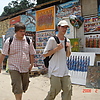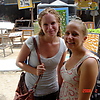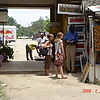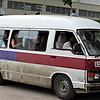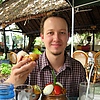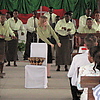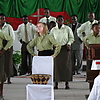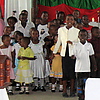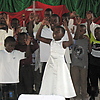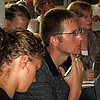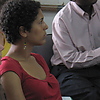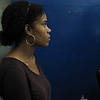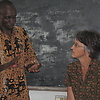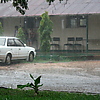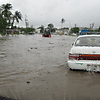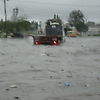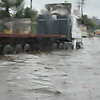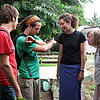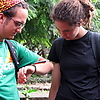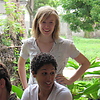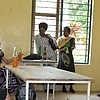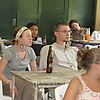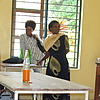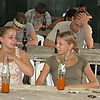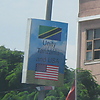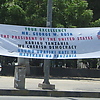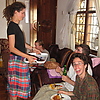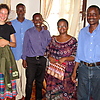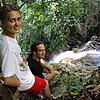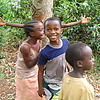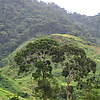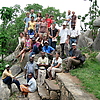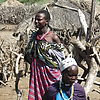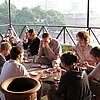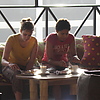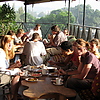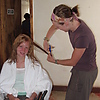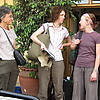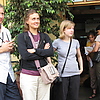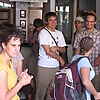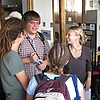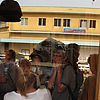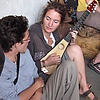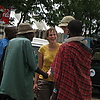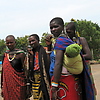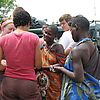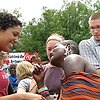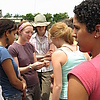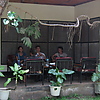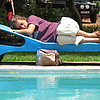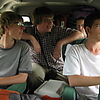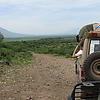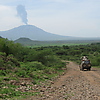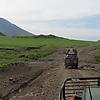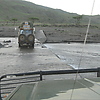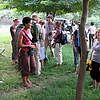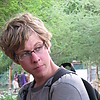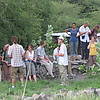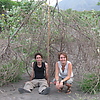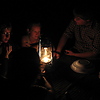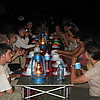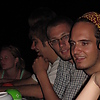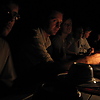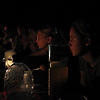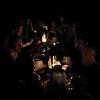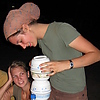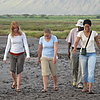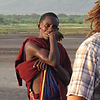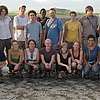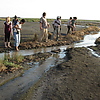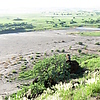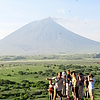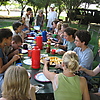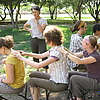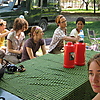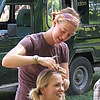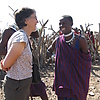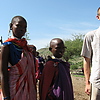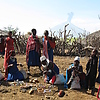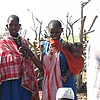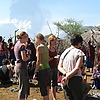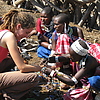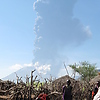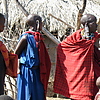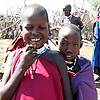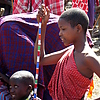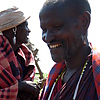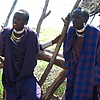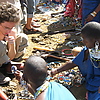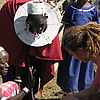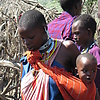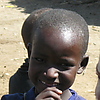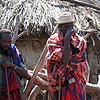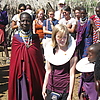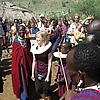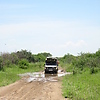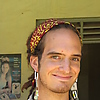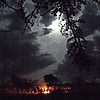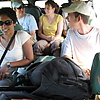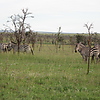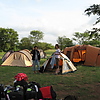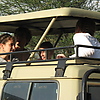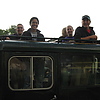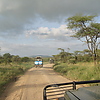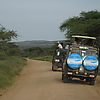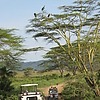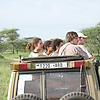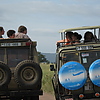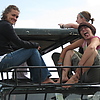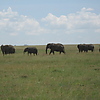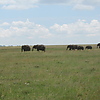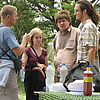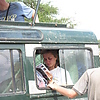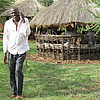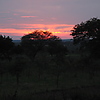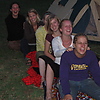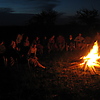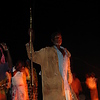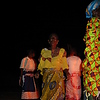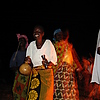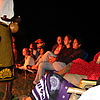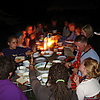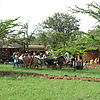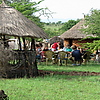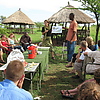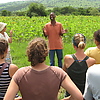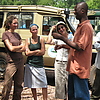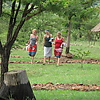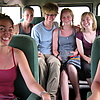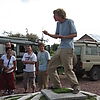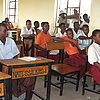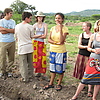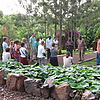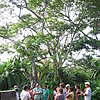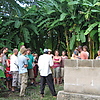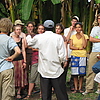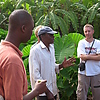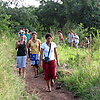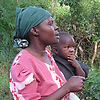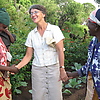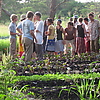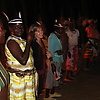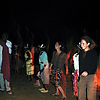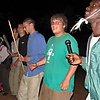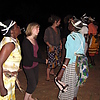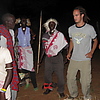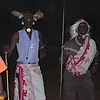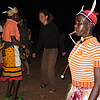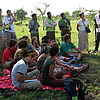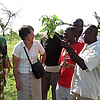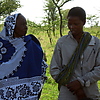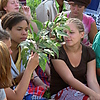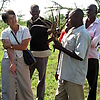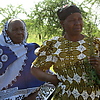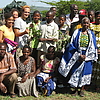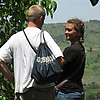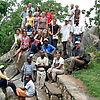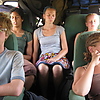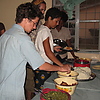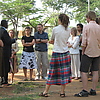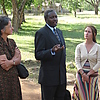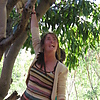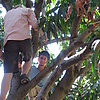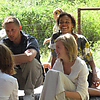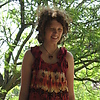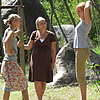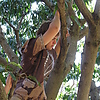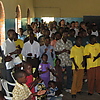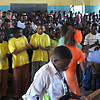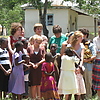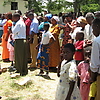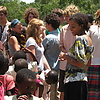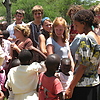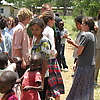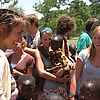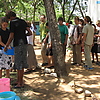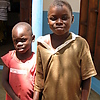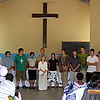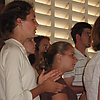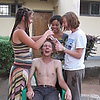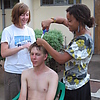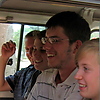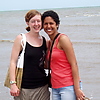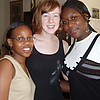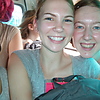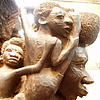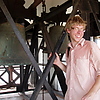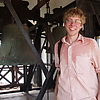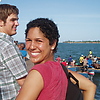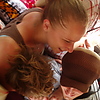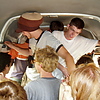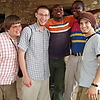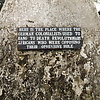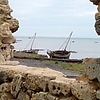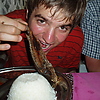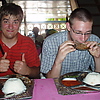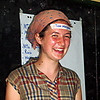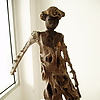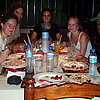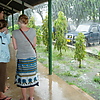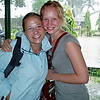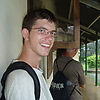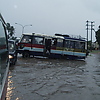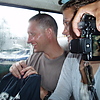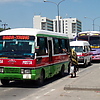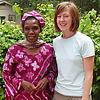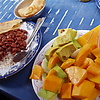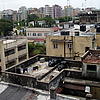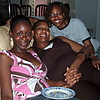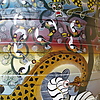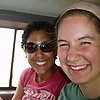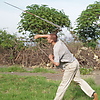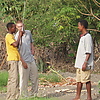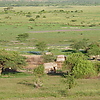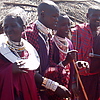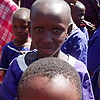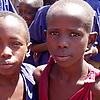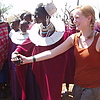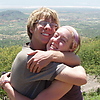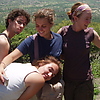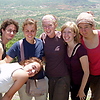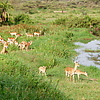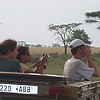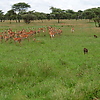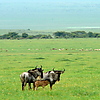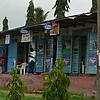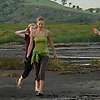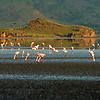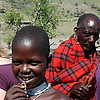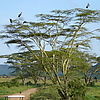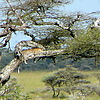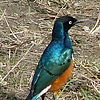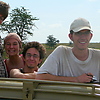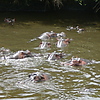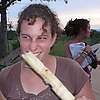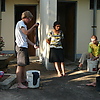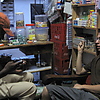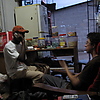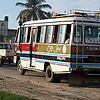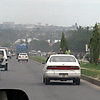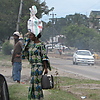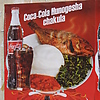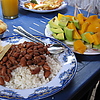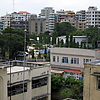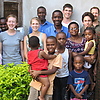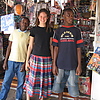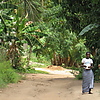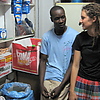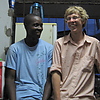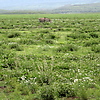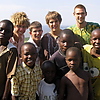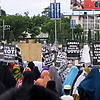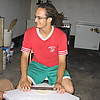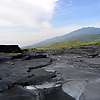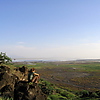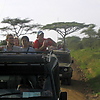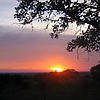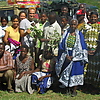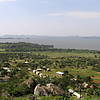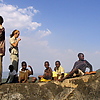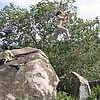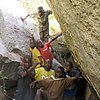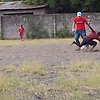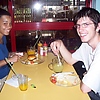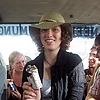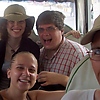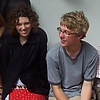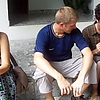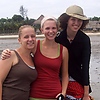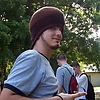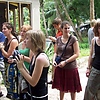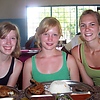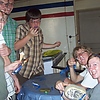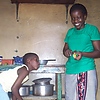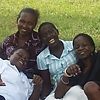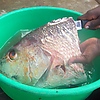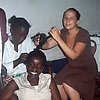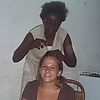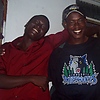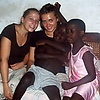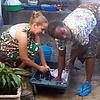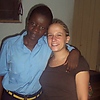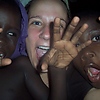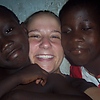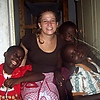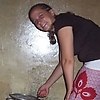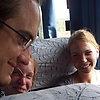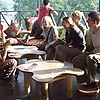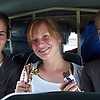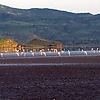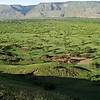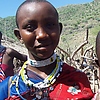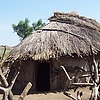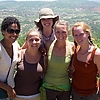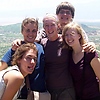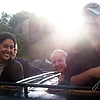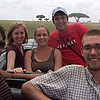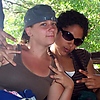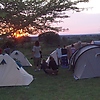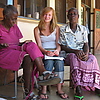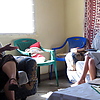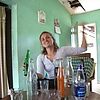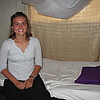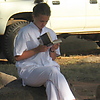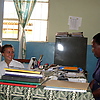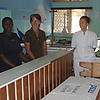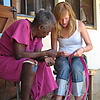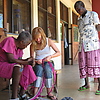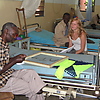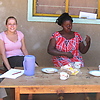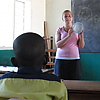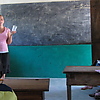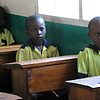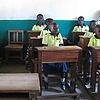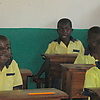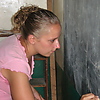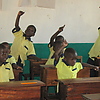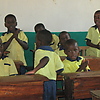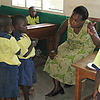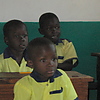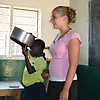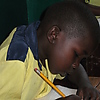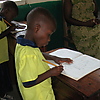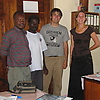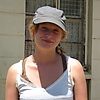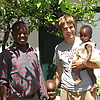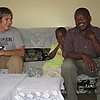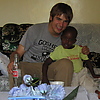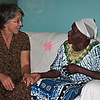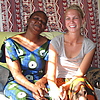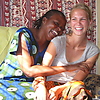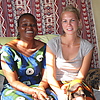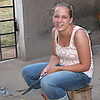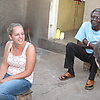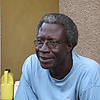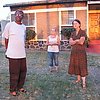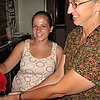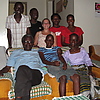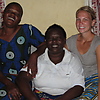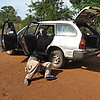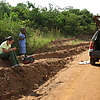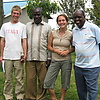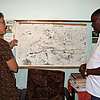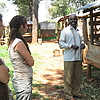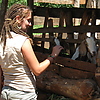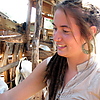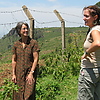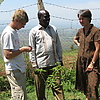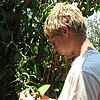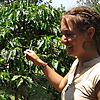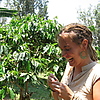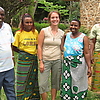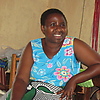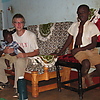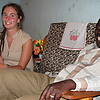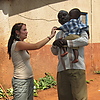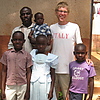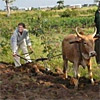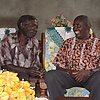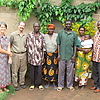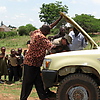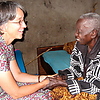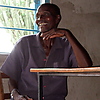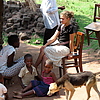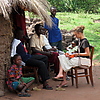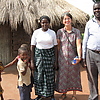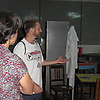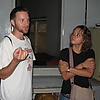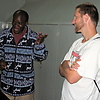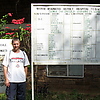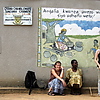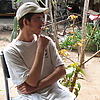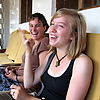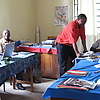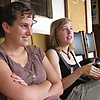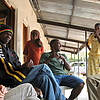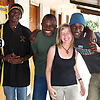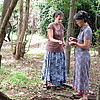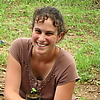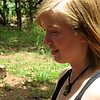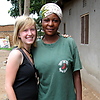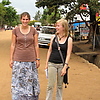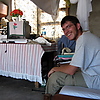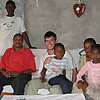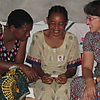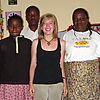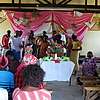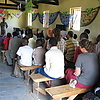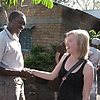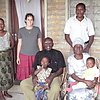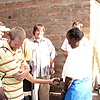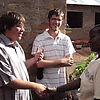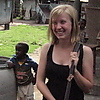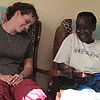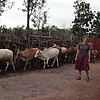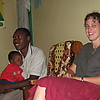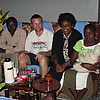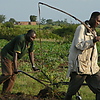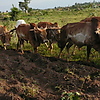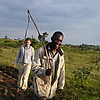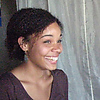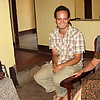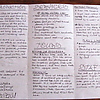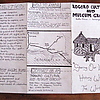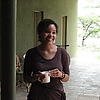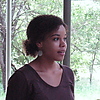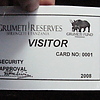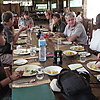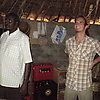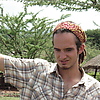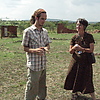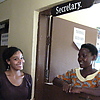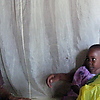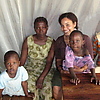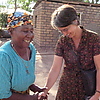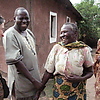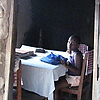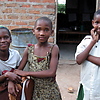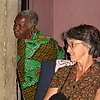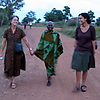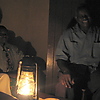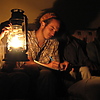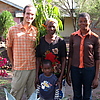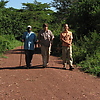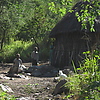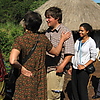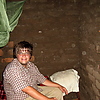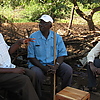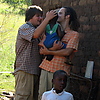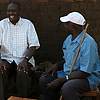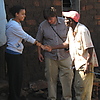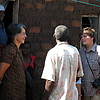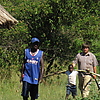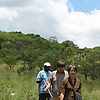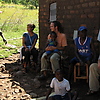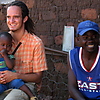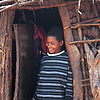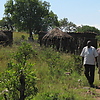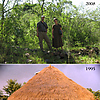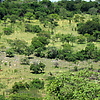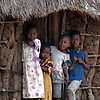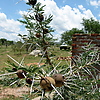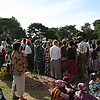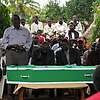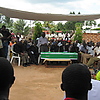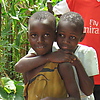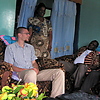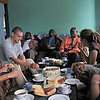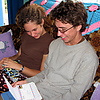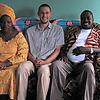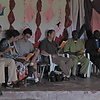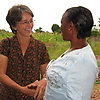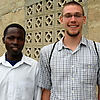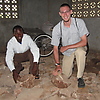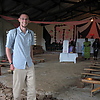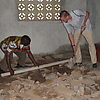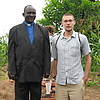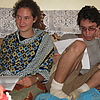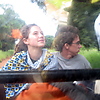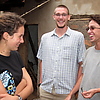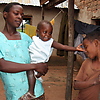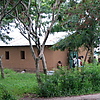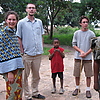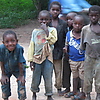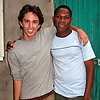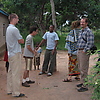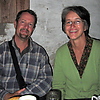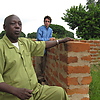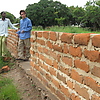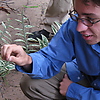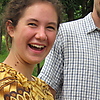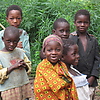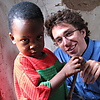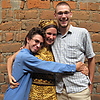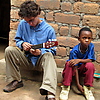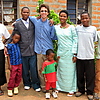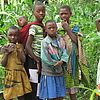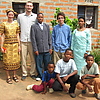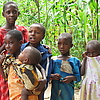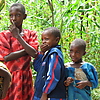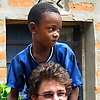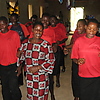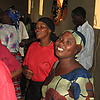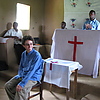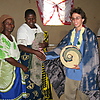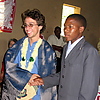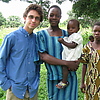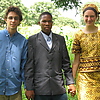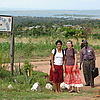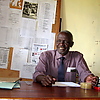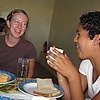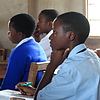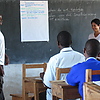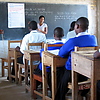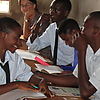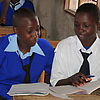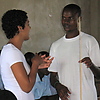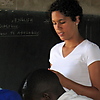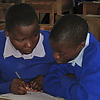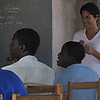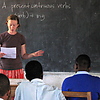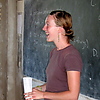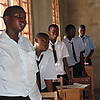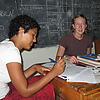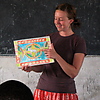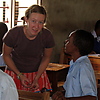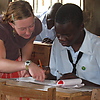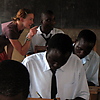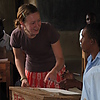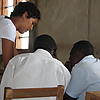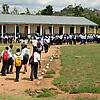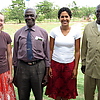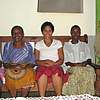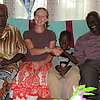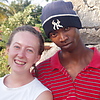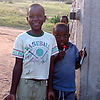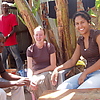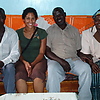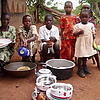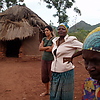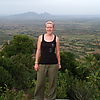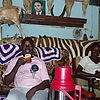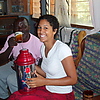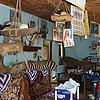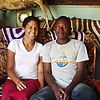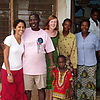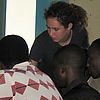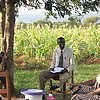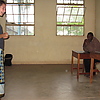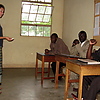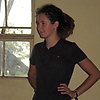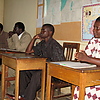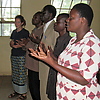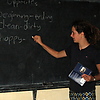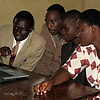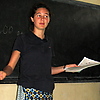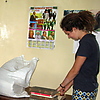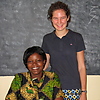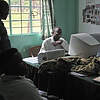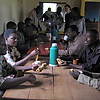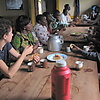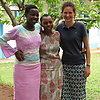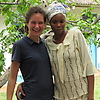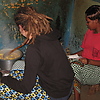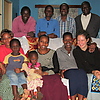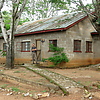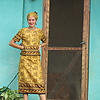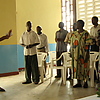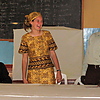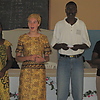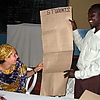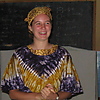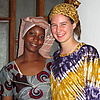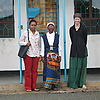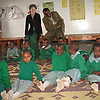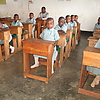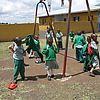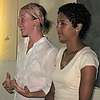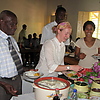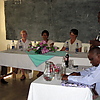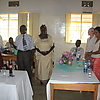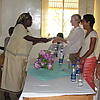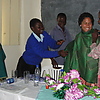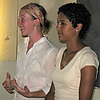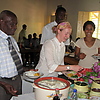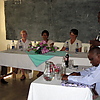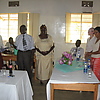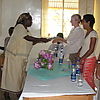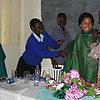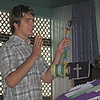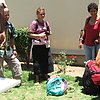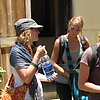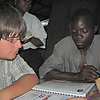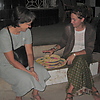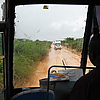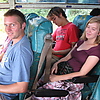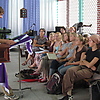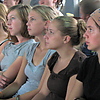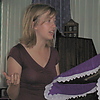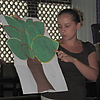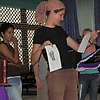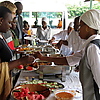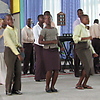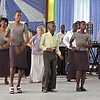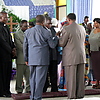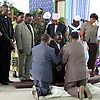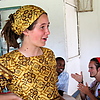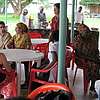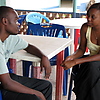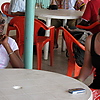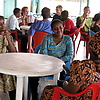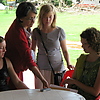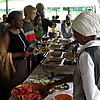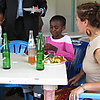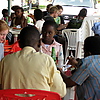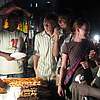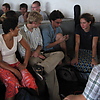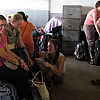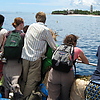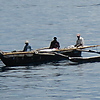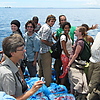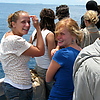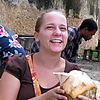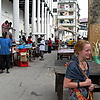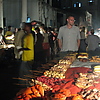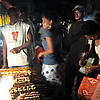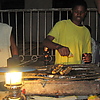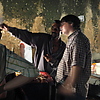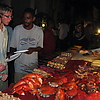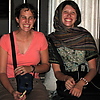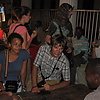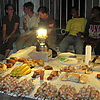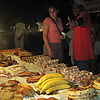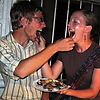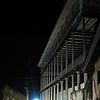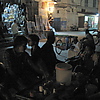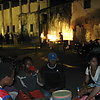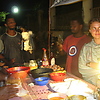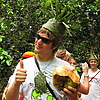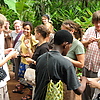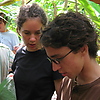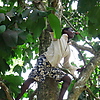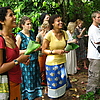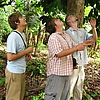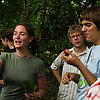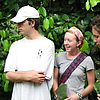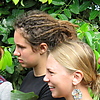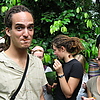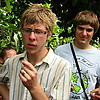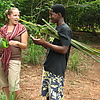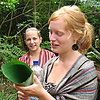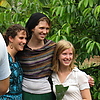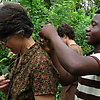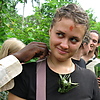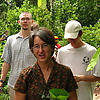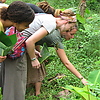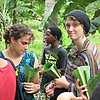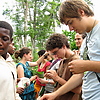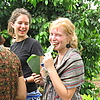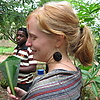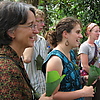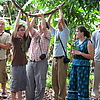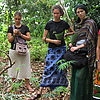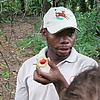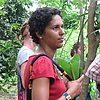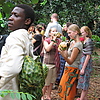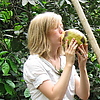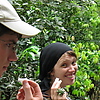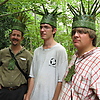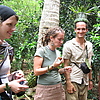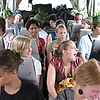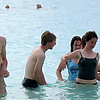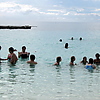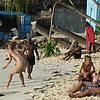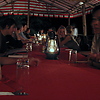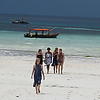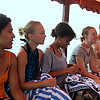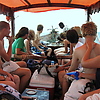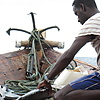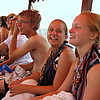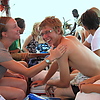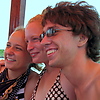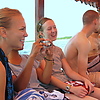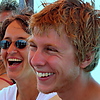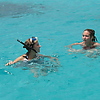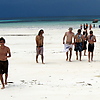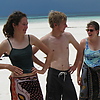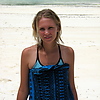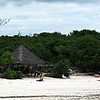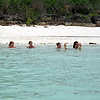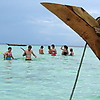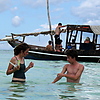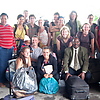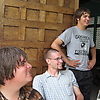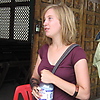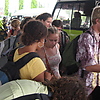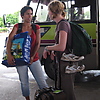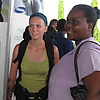Spring 2008 SST Unit in Tanzania
The Spring 2008 Unit has returned, but we'll leave the photos and stories here.
Wed, 9 Jan 2008Ready and waiting for the students!
Jan and I are ready and waiting for our students to arrive. We have a wonderful set of host families ready to welcome them into their homes. And Kiswahili teachers set to hone their skills. Look for pics as soon as I can get them up here when they arrive. We will also be posting their syllabus and other schedule information over the next couple of days.
Posted at 00:20 #
Fri, 11 Jan 2008
Arrived Once through immigration and with bags all collected, everyone loaded into a bus to take us to the Salvation Army compound where they will stay the night. This is also where the Swahili classes will be held.
We checked everyone into their (basic) accommodations, got them tanked up on water and sodas, had the teachers talk to them a bit, and then set them loose to wander about for awhile. Once the sun was down and things started to cool off we had an orientation meeting, a time for questions, and a chance to sing a couple of hymns and pray together before having supper.
Most of the students were fading pretty fast by the time we left them for the night. It will take a few days to recover from jet lag. Hope they all sleep well tonight. Us too! :)
Tomorrow they will have breakfast in the little canteen there and we will have another orientation meeting. Then around 11:00 am all the host families will come to collect their student for the weekend. Many will see each other in Church on Sunday again, but there should be lots of stories to tell by Monday morning.
We are all very grateful for safe travels and happy arrivals!
Posted at 14:22 #
Sat, 12 Jan 2008
Off with the host families
Then the host families began to arrive, greet their student and whisk them away to their new homes. A little nerve-wracking and plenty exciting.
A couple of notes about the pics...
Charity went home with Lydie's family as her host mother needed to take someone to the hospital suddenly. Alex went home with Noah temporarily as his host father is expected to return from Norway anytime. Matt was taken home with Isaac's host family as his host family is not yet back from a family trip to Syria.
Posted at 07:29 #
Mon, 14 Jan 2008
Sunday
We were *very* impressed with Leah! Not even 48 hours in the country and there she was singing -- and dancing (gasp!) -- in the choir. Because many of our connections here are with the Mennonite church, a good number of the host families are Mennonites. So we get to see almost half the students at Upanga Mennonite Church where we attend on Sundays. They even had to greet the congregation and introduce themselves in Swahili.
After church we were invited to a delightful afternoon sharing lunch and visiting with Rachel's family.
Enjoy the pics!
Posted at 13:39 #
Monday -- First day of classes
The Kiswahili teachers introduced the program and then split the group into four groups to get started. We also did an academic orientation and listened to stories of first impressions.
After lunch at the YWCA cafeteria came a walking tour of downtown, ending at the Mennonite Church where many of the host families met the students to show them how to get home.
All in all it was an exhausting day but full of many of the first triumphs. Note that their faces are still smiling!
Posted at 14:03 #
Tue, 15 Jan 2008
Kwetu
One afternoon a week (usually Wednesdays) all of the students come to "kwetu" (our house) to share lunch and stories and worship and singing. The students will lead the worship part in weeks to come.
This is a good opportunity to reflect together on what they are fascinated about or puzzled about as they observe and experience life in Dar.
Posted at 10:03 #
Fri, 18 Jan 2008
At the University
Wednesday after the Kiswahili classes we all went to the U.S. Embassy to hear their take on what the United States government is doing in Tanzania these days. We were able to hear from the First Secretary of Public Affairs who gave us an overview of the various units within the embassy and what they do, and the objectives and scale of the programs sponsored by the U.S. in Tanzania. To everyone's surprise (including the embassy staff's) the Ambassador himself chose to talk to the students and shared with them for nearly an hour. The U.S. is making truly enormous contributions towards fighting and treating both HIV/AIDS and malaria in Tanzania although that is not necessarily widely known as the war in Iraq dominates the headlines.(If you are interested, you can take a look at the embassy website: http://tanzania.usembassy.gov/index.html Sorry, no pics from the day as cameras are not allowed inside the embassy.
Thursday and Friday have followed what will be our standard schedule for most of the time in Dar -- Kiswahili classes in the morning, load onto a bus to the university (getting there about noon), having lunch at the amazingly inexpensive student-government-run cafeteria (under $1 for a good meal), relaxing until about 2pm, then having a lecture by a univerity professor on one of a large range of topics for about an hour. Then the students are free to hang about the campus and find their way to their homes by bus in the afternoon.
The students are finding the campus to be a welcome relief. It is beautiful, shaded and uncrowded with space to sit alone or in groups and relax, work on homework or talk with friends. And there are monkeys and baboons about to entertain you as well. Really!
Posted at 07:54 #
Mon, 21 Jan 2008
final host families Some of the pictures are of lunch at the student union, University of Dar es Salaam, classes on household items at the Salvation Army and some photos of a visit Peter and Jan took to the home of a friend who is involved in arranging tours and transportation for us across the Serengeti.
Posted at 14:25 #
Tue, 22 Jan 2008
Playing with Google Earth
Now that we have finalized all the host family locations, I can let you see all of these on Google Earth. Now to use this file you will have had to have downloaded and installed the Google Earth program from earth.google.com. Then you can RIGHT-click on the following link, choose Save As to save the file to your computer (make sure it saves with a .kmz extension) and open it in Google Earth (with File -> Open). You might want to spin the earth around to Tanzania and zoom into the Dar area to see the locations. If you crank up the heat in the room you are using to, say, 90 degrees or so you can better share the joy of the experience.
Posted at 07:45 #
Thu, 24 Jan 2008
Dala-dalas: a "thick description"
A couple of notes: First, many people in the group have had experiences on public transportation in a variety of developing countries. And many thought they knew what “crowded” meant. All agree they were wrong. Busses in Dar are something else altogether. Students have been fascinated with observing and learning the unique etiquette and appropriate body language when all remnants of “personal space” are gone. Dar is huge and students spend a lot of time on dala-dalas and they have proven to be one of the most challaging and fascinating aspects of life in Dar.
Second, a little further explanation. To become a dala-dala, a normal size minivan is fitted with 15 seats + the driver. Adding several sitting on the engine cover behind the front seats facing backwards and several standing, figure 22 person “normal capacity”. That’s before you add all the other adults and school children than need to get on. If you have a minivan handy, put 22 people in it sometime and see what we mean. For an even richer experience, go ahead and turn the heat on full blast and then stay in there for an hour or so.
Now, Bekah’s essay:
Transportation in Dar: scenes from the mzungu girl on the dala-dala.
I would consider myself to be an adventuresome person. In the past I have enjoyed activities like skydiving, freefall, whitewater rafting and traveling to “out-of-the-way, locals-only, if-you-get-lost-noone-will-find-you” places. But nothing – NOTHING – could have prepared me for the unique experience/thrill/power-prayer-time that is public transportation in D’salaam.
“But what,” someone might ask, “is a dala-dala?” In order to truly discover the answer to that question, they need to ride one. But if that is impossible, perhaps I can paint a mental picture of what it encompasses…
Imagine a mini-van/minibus, usually Toyota or Isuzu and an early model. Inside everything is stripped so more seats can fit in. (Think no trunk space).
Once the seats are all in – and covered in vinyl – it becomes necessary to upholster the ceiling with your choice of loud, gaudy “budget hotel lobby” carpet – preferably with some sort of fringe going around the edge – and install some sort of pipe as a handrail on the ceiling. On the outside of the bus in is necessary to paint a brightly colored strip all the way around with “City Bus” stenciled on the side and the route stenciled in white on the front above the headlights. After you have the basics down you can decorate your dala-dala with inspirational messages like “God is Great” or “Viva Manchester United” or “Still Alive” on the back and front windows.
Now the dala-dala is ready for passengers. If you want to catch a dala-dala it is important to master the “forward-jostle” method, as well as the “Yo! I want on that bus!” wave. Once mastering these important methods has been accomplished, you wait at the side of the road for awhile – usually enough time to gather a small crowd of similar like-minded people. Seeing your bus approaching you try out your wave … and get a wave back from the conductor as it speeds on by. Frustrating, but not an uncommon occurrence.
Another bus approaches and you are delighted to see that it is stopping. As you run towards the door you can estimate that there are at least 30 people crammed inside. No matter, at least 5 more will fit in, 8 if there are small children.
Practicing your “forward-jostle” you are able to physically get your front half and feet on the bus and at least one hand on a cleverly placed pipe. The rest of you is hanging off the bus but the conductor swings up and presses you in a little more as you speed off. The conductor, whose body is currently very close to yours and actually keeping you on the bus, is excellent at multitasking as he is somehow able to hold on, collect money, make change, make small talk with passing dala-dala’s, yell out the stops and remember when and where you want to get off. As you approach your stop you can yell “susha!” and off you go, still alive to see Manchester play and praise God!
For only 300 Tanzania Shillings [about 28 cents US] all these thrills can be yours. Nothing in the US can even compare. Transportation in Dar: it’s a wild ride.
Bekah
Posted at 08:07 #
Sun, 27 Jan 2008
Bagamoyo
We were able to visit many of these archaeological and historical sites, including the catholic mission and museum. The students also enjoyed a swim in the ocean after getting a LOT of sun walking around the town. In the evening we were treated to a drumming and dancing lesson from College of the Arts teachers. On Sunday the students had a little time to walk around the town, explore the ruins, think about what it may have been like when the slave caravans were active, and chat with some of the artists working in Bagamoyo.
This trip was the student’s first chance to see some of the countryside outside of Dar es Salaam. They had a good time together at our guesthouse called “Mary’s Nice Place” (and it was!!). They also had a chance to demonstrate their “tree-hugger” credentials with the amazing, centuries-old baobab trees.
Sorry for the paucity of pics the last few days. Here are a bunch of them for you to see that we are all alive and well (but sweaty) here in Tanzania.
Posted at 13:08 #
Fri, 1 Feb 2008
Mail!
Everyone seems much more at home now with the transportation system, knowing how things work, where to get on and off etc. Since not everything is quite so new now and they have a chance to more closely examine this place, their reflections in the essays they write to us are much more detailed. These are pretty interesting and we will try to get some more of these posted for you as we go along.
Here are a few pics from the week. Tom Meyers (Director of International Studies at GC) is visiting this week helping us evaluate how this new program is going and what it might look like in the future. He met the students as they came to our house Wednesday for our 'together' time of sharing and worship, and had a chance to talk to them about how they feel about things so far. Once Tom's baggage arrived (24 hours after he did) he was able to distribute the letters you all had sent. Thought you might like to see what joy letters from home bring to their faces!
This afternoon is a field trip to a local radio station (where they will interview some of our students) and TV station (not sure what will happen there), hosted by Leah's host father. He is a producer of documentaries for both radio and television and has offered to show us around. I will try to get some pics of that experience to share with you too. Internet speeds here are MUCH too slow to allow me to upload video and sound files, but maybe we can get Tom to take some back with him to share on this site.
Peter
Posted at 01:10 #
Sat, 2 Feb 2008
Media in Tanzania After lunch together at the Salvation Army, they traveled into town to the location of the Upendo Radio Station in the Lutheran Center. Leah’s host father, Pastor Magafu, talked to them about his work producing radio and television programming on behalf of many denominations that are part of the Christian Council of Tanzania. Religious programming – Christian, Hindu, Muslim -- concerning social and political issues in Tazania are allowed – even encouraged – on the national radio and television stations. There are also more than 100 independent newspapers published in the country. This surely represents a level of press freedom found nowhere else in Africa.
We were given a tour of the radio production studios and the broadcasters showed us the equipment they use and the steps needed to get programming on the air.
The trip to the television station did not work out this time. Perhaps another day.
No field trips this weekend so students are free to pursue their own interests. Several are having opportunities to participate in weddings. We will have to see if we can get them to share some pics for you.
Posted at 02:35 #
Mon, 4 Feb 2008
Art in Tanzania
This week we are looking at art in Tanzania, trying to understand how the artists choose what to produce, what sells, how art has changed, how people make a living. Today after Kiswahili class lunch at the university, most of us visited an area close to the Mwenge bus stand where wood carvers work and a variety of small shops sell artwork. Most of the students have observed that there is very little art on display in their host homes and one has to wonder who buys all this work! Some of it is a very high quality and the craftsmen are proud and eager to talk about their work.
A small note: Bekah has found that she gets less unwanted attention on her way to and from her host family’s home if she wears hijab.
Posted at 10:38 #
Wed, 6 Feb 2008
Singin' and Dancin'
Posted at 13:00 #
Sat, 9 Feb 2008
Ben's neighborhood Here is Ben's recent essay. We think it is a great example of the kinds of discoveries the students are making.
Community Investigation, Ben
From the first time I entered it, especially my first time through on a weekend night, I found my neighborhood to be a vibrant and wildly intriguing place. Just off Sam Nujoma Road by the OilCom Station lies Mwenge Mlalakuwa, my home for these five weeks in Dar. This street to my house is lined with dukas (shops), quite literally. From the corner store all the way to the last bar about 200 feet from my house the 10-foot wide dirt pathway boasts one store after another with barely a break in between. There are pharmacies, bars, general stores, barbers, just about anything you could ever need to buy can be purchased at one of these dozens of stores. The road is always lined with people. In the morning women with babies strapped to their backs fry maandazi. In the afternoon men sit outside their dukas and play checkers with old bottle caps. After dark the torches come out with people plying inexpensive delicacies like gum or grilled corn. And all day, everyday, groups of young children run around together playing with whatever combination of sticks, stones, and bags they are using as toys at the moment.
Mlalakuwa is quite the place, full of life and activity – dukas connected to living quarters, the line between home and business constantly being negotiated. It was not until I asked my brother Wanse to show me around one evening, though, that this neighborhood truly opened up to me. I now realize there is a whole new life beyond the street I walk everyday, secrets and stories concealed in a place I thought was becoming routine.
Wanse led me across the street from our home down a little alley I assumed led to a backyard area. Perhaps we’re going to visit someone? I followed quietly, as I’ve embraced the idea by now that I rarely know where I’m going or what I’m doing here! My sense that this was no more than a trip down a narrow alley into the neighbor’s backyard was only furthered by the fact that we greeted the neighbors on their back stoop from our path. It was dark, so I could not see the way ahead. Somehow, the narrow path kept going and before long we were in the middle of a labyrinth of uneven alleys just big enough for one or two people to walk across. Simple houses were illuminated in a mix of cool, bright fluorescent bulbs mingling and clashing with the warm, red candlelight of the neighbors. Women and children were huddled around fires preparing the evening meal. Here was a whole new Mlalakuwa I had never even imagined existed.
As we walked, I discussed the logistics of this place with my brother. He explained that some houses have electricity and others don’t. With the constantly uncertain state of the hydro-electric dependent power supply, though, all are accustomed to living without. The power went out as we were walking, only one harsh light piercing the sky from next-door neighbor Mlimani City shopping center offering a beacon of a reminder of what you can do if you have resources. As Wanse told me about the time the year ago when the power was out for four months a flicker of light appeared and a shout rose up from the entire neighborhood as the power returned. It was like nothing I’ve even heard and I will never forget its joy.
I asked where people go for medical care. He showed me the location of a small clinic just across the street from us I never knew existed. People can come there for simple medicines and treatment while more serious cases go to one of several nearby hospitals. I asked how a sick person with trouble moving would get out of the maze of tight streets, but he just sort of chuckled and moved on. Despite my lack of ever seeing it in three weeks, people do create some garbage here and there is a means of picking it up, as I finally witnessed Saturday morning. Wanse said it is supposed to happen once a week, but will often be less frequent. Men pulling carts collect the trash, stuffed in varying bags, with their bare hands, walking back these tiny alleys to collect from house to house. People are connected to the city water supply and everyone has extra tanks in case it is turned off that could supply a household for 2-3 days, according to my brother. He said people work at all different places, including offices, and that an average salary may be about 60,000 (about 56 US$) shillings per month. When I asked him how people support a household on this, he told me he wonders the same thing.
If there is one thing I’ve seen less of then garbage here, its police officers. I could count on my one hand the number of marked vehicles (maybe I just don’t know what to look for?) I’ve seen since arriving. Needless to say, this presence is less than awe-inspiring but Wanse assured me that people continue to follow the laws regardless of this lacking enforcement.
Discovering this new part of my neighborhood has today been one of the most astonishing things that has happened to me while here. I’m itching to go back, perhaps in the daytime next, to see what I can discover. I realized what I take for grant as “just happening” at home when I considered the questions I was asking Wanse. Would I know the answers to these for my own home if someone asked? As helpful as his responses were, I can still only imagine how this community functions. What would it really look like for a medical emergency to be dealt with here? How do you get a laboring mother out to the road without roads? How do you get to the hospital without a car, or a car that is parked so far away you ride daladala (bus) to pick it up, as Wanse said some do). What if I needed police help back in the depths of the community? How would they know where to find me? Perhaps I can only imagine how the inner-workings of Mlalakuwa really are accomplished. For the time being, though, I’ll keep my eyes peeled to see what I can see – if I found the garbage collectors, perhaps anything is possible!
Posted at 07:58 #
Students share pics
Posted at 08:17 #
Mon, 11 Feb 2008
Rain comes to Dar
There are a few pics from church this Sunday at Upanga Mennonite. Our own Leah was front and center in the choir, and the entire service was led by children and youth which was pretty entertaining. This is our last week of the academic part of SST. We are looking at environmental and conservation issues in preparation for next week when we take a camping safari across the Serengeti to get the group to Mara Region (near Lake Victoria) where most of the service locations will be. There are also a couple pics of our son, Daniel, who was able to visit for a week on his way to his MCC assignment in India making his parents very happy!
Posted at 15:31 #
Sat, 16 Feb 2008
Finishing up in Dar
This weekend marks the end of our time in Dar and students are visiting each other, spending time with their families, doing some shopping and visiting places they had always meant to see but hadn’t yet gotten around to. Friday evening we had a lovely visit with Ben’s host family, talking way into the night solving the worlds problems. And this afternoon had a great time with Annali’s family featuring, of course, a wonderful meal.
President Bush arrived here in Tanzania today and this is a VERY BIG THING here! Signs and flags and banners everywhere. There were assorted bottlenecks at the airport and various roads being are scheduled to be closed around town over the next four days, all of which go with very tight security around this visit.
And there are a couple of pics from Benito from a trip several students took to Morogoro last weekend.
Finally, we wanted to share an essay that Annali wrote about visual art. We are blessed with a number of art majors on this trip and their insights and heated debates about the arts in Tanzania have been great.
Makonde carving uses large chunks of ebony and forms usually an animal, something related to "shetani" or spiritual representations, and "ujamaa" or working together. Ebony is a very hard wood and takes a long time to carve. Carving is embedded in Tanzania’s history. Ethnic groups specialized in these carvings long before colonialism and the current tourist market. The exaggerated animal and spirit figures reflect this time. The "ujamaa" are a perfect example of the influence of President Nyerere's socialism on every aspect of Tanzanian life, including its art. The figures in these pieces are intertwined and built on each other, helping each other out. People are still very proud of this vision even now, years after socialism has ended.
TingaTinga, according to our lecturer, was started by a man named Edward TingaTinga in the late 1970s. It became wildly popular and sold very well. People put together art collectives to make and sell in mass form. TingaTinga uses thick enamel paint (for bicycles) which the artists thin with oil. Most of the colors come straight from the tube. The figures are exaggerated, flat, repetitive and are usually animals or Maasai. There is usually a background with another object painted on top. Talking with the artists I discovered it takes about a week to complete a large painting, five days for a medium and two for a small. At Morogoro Stores they have stacks and stacks of these pieces. It is an art co-operative so everyone works together. Unlike some artists in the US, people here seem to strive to be similar. TingaTinga is collective art. People don't feel bad copying other people and self-expression is not the object. It almost seems like the artists are living models of the Ujamaa Makonde sculptures.
Most of this art is purely for tourist consumption. Artistic expression is confined to what sells. This is true for TingaTinga as well as some ngoma dance. The growing tourist audience from the west according to the book "Peformance and Politics" has influenced the ngoma dance shift to more traditional dance. This "performative primitive" builds on western expectations of the African "savage male" and "erotics female".
While much of this art is produced for the tourism market, it still expresses something about Tanzanian aesthetic, work ethic and sense of collectivity. I think it is impossible to create art, whether TingaTinga or ngoma dance, one’s whole life and never have some self-expression, whether conscious or unconscious, show through every once in awhile. The intention of TingaTinga is commercial. But despite catering to perceived tourist tastes, what actually gets produced and in what settings, still says something significant about Tanzanian life and aesthetic.
This week I and some others stumbled across an ngoma dance troupe practicing at the Nyumba ya Sanaa. The drums, traditional call and response, and gyrating hips matched Laura Edmonson’s description in “Perfomance and Politics” perfectly. It was a young group of 18-20, some students, half drummers and half dancers. There were about three women and the rest were men. Probably the most informally dressed of anyone I’ve seen here yet, many of them were barefoot. When five of us showed up, they invited us over and proceeded to perform a string of their songs. Most of the songs involved singing, drumming and dancing (choreographed and freestyle) and for a few, props like brooms and sticks. I was completely in awe from the beginning, and they just kept doing song after song. Then Thursday I attended Afrodynamix, an afro/jazz/hiphop group performing at the French Cultural Center with a completely different feel, more polished and done for a sophisticated crowd.
Then there are the loud, pulsating strains I hear every night of the ever popular Bongo Flava (Tanzanian rap) coming from the Segerera bars. My housekeeper listens to Bongo Flava on her mp3 player and almost every young person I've talked to about music cites it as a favorite. Then there is the always present gospel kwaya (choir) music. As I write this the radio outside my window just got tuned to a choir station. As explained by Dr. Imani Sanga, this music is an intercultural practice that takes and shares music from popular, traditional and international sources and integrates it. Trippy music videos often involve a singer superimposed onto some remote scene, and the repetitive dance movements point back to some of the more traditional and rural areas.
Annali S., The Arts
Visual art in Tanzania is primarily dominated by two common types: The ebony carved sculptures of Makonde and the repetitive cartoon-like painting of the very popular TingaTinga.
Posted at 12:50 #
Sat, 23 Feb 2008
Safe and sound in Musoma Monday most head off for their new host families and service assignments. Annali's assignment will be here at Nyabange and Alex and David will stay with us for a few days before heading to Tabora.
But, for tonight, everyone is happy to be showered and clean and in a real bed!
The picture is of the whole group (including driver/guides and cooks) at the home (now museum) of President Nyerere in his village of Butiama.
Posted at 14:27 #
Mon, 25 Feb 2008
Dar to Lake Natron
The ride to Arusha is about 9 hours, but it is a pretty comfy bus (where you have your OWN SEAT!!) and on paved roads. There was a quick stop midway for everyone to grab lunch. After dropping off the rest of the passengers late afternoon in Arusha the bus took the group right to the Backpacker Hotel where we were to spend the night. All of us rediscovered a couple of other luxuries: cool temperatures (now that we were away from the coast) and hot showers!
Supper and breakfast on the rooftop restaurant overlooking the busy center of Arusha. The driver/guides and cooks who would accompany us on the rest of the safari arrived with their LandRover and LandCruisers and camping gear early in the morning. With all of us and all the luggage it didn’t look like there was ANY way we were all going to fit, but these folks were masters of packing. We all packed ourselves in and after another stop or two to load up on water and other necessities we were on our way,
From Arusha we were headed up to Lake Natron where we would camp for the first night. Not to far out of Arusha, and until you get into Serengeti, you are in an area of the country mostly occupied by Maasai people. Anytime you stop there are women who would love to show you their beadwork and convince you that you really need to buy some of it. There is a lot of really beautiful work and some in the group didn’t really need that much convincing.
Oldonyi L’Engai – Mountain of God – put on quite a show for us as we approached our campsite at Lake Natron. It is a VERY active volcano and every little while it would shoot huge plums of ash and smoke into the sky and down the slopes, then quiet down to just a wisp again. You will see it in various stages in the background in many of the pics. And at night, when we were camping only a few miles from the base, we could sit under the stars and watch the glow and the lightning generated within the ash cloud. Pretty spectacular display! We were pretty pleased with ourselves for having arranged this…
The first night camping when our tour people set up the camp we discovered the first glitch of the trip – although we had pads or air mattresses, they had forgotten to bring sleeping bags. Or rather they had gotten the idea somewhere that we had them with us. In any case they weren’t where we were! Fortunately many people had kangas or kitenges to wrap themselves in that first night and, in any case, it was still warm there. Knowing that Serengeti would be much colder, the next day we bought Maasai blankets – you will see these bright red and blue blankets in some of the pics.
All along the trip our three cooks managed to produce really good meals for us, plenty of food even though we have some students along that can eat prodigious amounts! Eating at night by lantern light under the amazing starry sky was a great experience.
We took an early morning trip from our campsite to the lake nearby while the cooks got breakfast around. The area around the lake is soft and muddy so we parked the vehicles and walked. Lake Natron is the breeding grounds for the Flamingos that populate most of the Rift Valley lakes of Tanzania and Kenya and there are lots of other water birds there as well. With the morning sun warming things up, the lake, the birds, the spectacular landscape and the Maasai bomas all together made for a great way to start the day.
Back at the camp the tents and all the gear got packed up while we ate breakfast (a person could get used to this style of ‘camping’!) and we were off towards Kline’s Gate at the North East side of Serengeti National Park. The landscape seems to change every few minutes as you travel.
(continued)
Posted at 00:16 #
Serengeti to Nata to Musoma
We camped at the Seronera Campground in the center of the park. Much cooler there and we were glad for the blankets. Keep in mind we are not talking “cold” from the perspective of a Goshen winter, but 70 degrees or so feels pretty cool when the coolest you have been for the last month and a half is a balmy 85 or so!
Most of the next day (Thursday) was spent exploring the park. After an early breakfast, we all set off for a morning game drive with the roofs open. There is so much to see – the landscape is, again, overwhelmingly beautiful and the animals are everywhere. First time out we saw a leopard sleeping off her nighttime meal in a tree – a rare site. I think Ben’s comment was that he never saw an animal looking more relaxed.
The vehicles weren’t always together so we didn’t necessarily see the same things but everyone had a great time being able to take our time observing the world around us. Those of us in two of the vehicles were incredibly lucky and came across a lioness stalking a pair of waterbuck. We shut off the vehicles and watched her stalk for a half-hour or so as the waterbuck, unaware of her presence, grazed nearer to her. Suddenly she exploded out of the grass and she chased down and killed the female waterbuck rightin front of us. Quite an adrenaline rush and we were all a bit stunned at what we had just seen. Let’s just say it is a VERY different experience than seeing it from a couch on TV. (This was not something tourists often see. Our family spent several weeks over the years camping in the Serengeti, and a few years back I spent three days a week for a year and a half there and never saw a lion kill.)
After lunch and packing up we did some more game viewing as we headed out of the park at Ikoma Gate on the North-West side. Now we were into the area where Jan and I feel very much at home. Some 12 years ago our family lived in this area while we did graduate research. Jan interviewed older people about their memories of what they had been told of pre-colonial history, and I worked in the Serengeti on their GIS project mapping vegetation and ecosystems.
An hour or so after leaving the park gate (oh best beloved) we arrived at our camping location for the next two nights at the Rogoro Cultural Center. Our good friend and brother, Nyawagamba Magoto, has created the center to house a small museum of some of the traditional items from the history of several local people groups, and also to try to attract some of the tourist traffic in the area to both the museum and a campsite. We were well received! They had butchered a cow for us so we had lots of BBQ’ed meat to go with the rice and ugali and other food. Both evenings we stayed there, local singers and dancers from the area performed for us way into the night around a large fire.
Very close to Nata, the Grumeti Reserves is a conservation effort of a private investor who has leased from the government control of a very large game control area. The model there is VERY high end tourism (a double in their lodges start at $3000 a night) who pay these high rates for exclusive access to these areas. All of the profits from the lodges and campsites are reinvested into the operation, and into the surrounding communities for projects consistent with conservation and environmental protection. On Friday the folks responsible for helping the communities plan for and use these moneys talked to us about the ins and outs of private conservation efforts, and spent a good part of the day showing us projects they have been supporting. Charity will be working with these folks and, on the other side, Benito will be helping out the efforts of the people developing the Cultural Center.
Another one of the projects is an irrigated garden projects in a tiny village called Bugerera 6 km or so from Nata town. This is where our family lived during our research, and where Matt will be living and working for service. For many of the students this was a first time close up and personal with rural life in a very (economically) poor area of Tanzania. Like a very large part of the population in rural Tanzania, these would be the folks living on something in the order of $0.65/day. Grumeti Reserves provide a ready market for all the high-quality fresh vegetables they can produce and make it possible for people living there to make a reasonable living.
Saturday morning we packed up the vehicles again for the last time for the 3 hours or so to Musoma town on Lake Victoria. On the way we stopped by Butiama, the home village of the late President Julius Nyarere. The students have heard a great deal about this fine man and the museum there houses press clipping and memorabilia from his life. We also visited his grave there. The large group picture (including our drivers and cooks) was taken here also.
Finally, on to Musoma. The students filled the Mennonite Center Guesthouse in the city to capacity and it was a comfortable safe place for them to gather, relax and eat for a couple of days before heading out to service. We had a final group worship service there after arriving on Saturday evening and collapsing into real beds.
Sunday we spent most of the day together in Nyabange, the old mission station about 10 kms from Musoma. This is where our family lived for 6 years in the 80’s – in fact the church has given us our old house for these 6 weeks! We joined with the Nyabange Mennonite Church congregation for church. Then the Mennonite Theological College of Eastern Africa which is also located here planned a really nice welcome for us that included lots of choirs singing and a fine lunch. Annali will be living here at Nyabange and working with the Theological College. Sunday evening we got together for our last meal together before service as people will start heading to their assignments early Monday morning.
Monday update: it is about 4:30 in the afternoon as I write this. All of the students have either arrived at their service assignments or are on the way. Except for David and Alex who will be going to Tabora: we have arranged for them to leave on Thursday. In the meantime they will be staying here at Nyabange with us. We will let you know when everyone is safely tucked into their assignments.
I hope you enjoy all the pics. There are lots more pics and stories about this trip to tell, but you may have to wait to ask the students yourself!
Peter
Posted at 09:50 #
Wed, 27 Feb 2008
All tucked into their service locations
We will wait a couple of weeks for the students to settle in and then begin visiting each of them. In the meantime we will select some pics from the past weeks to post from time to time so you don't get bored.
Students will have different access to internet -- some of them at their host families and some of them not at all for weeks at a time. So if you don't hear from them for awhile it does not mean that they don't love you. With the proliferation of cell phones, we can be in contact with them pretty quickly if necessary.
Posted at 13:08 #
Fri, 7 Mar 2008
Pictures from Laura to keep you happy!
We did relocate Laura and Lydie to a new assignment at a secondary school not too far from Musoma town. There was a bureaucratic snafu with the school where they were assigned in the village of Buturi – yes, there are bureaucrats here too! It was unfortunate as they were settling nicely and really liked the village and the students. But they are also really liking their current assignment and settling in well there too. We appreciate having flexible students!
This Sunday we will start the rounds of visiting all of the students at their service assignments. We will visit Shirati (Britta, Rachel, Ben, Lauren, Emily), then Tarime (Noah and Allyson) on Tuesday. Back home a couple days, then Friday we go to Mugumu (Leah, Andy, Isaac, Grace) and Monday Nata (Charity, Benito and Matt). Over Easter weekend we will be in Tabora (David and Alex). Somewhere there in the middle we will visit Lydie and Laura here in Musoma and Annali who lives just 2 houses from us. And see what we can do about visiting Bekah way over there in Arusha!
Some of the students have email access nearby and some are really far from email. If you want to email a letter to me (pdshetler@gmail.com) we will print it out and take it to them as we visit.
We will update this blog with new pics and stories about the students on service when we get home between trips. In the meantime, Benito, Annali, Emily, Grace and Laura have shared pics with us from before service and we thought perhaps we should share them with you so you don’t forget us! These are from Laura and I will make separate posts for the rest so you know who gets the credit for the pics.
Peter
Posted at 10:15 #
Grace's pics
Posted at 10:28 #
Sat, 8 Mar 2008
Annali's pics
Posted at 00:28 #
Benito's pics
Posted at 00:31 #
Emily's pics
Posted at 00:33 #
Wed, 12 Mar 2008
Visit to Shirati – Ben, Britta, Emily, Lauren, Rachel
Shirati is the first place that Mennonite missionaries came to in Tanzania back in 1934. Out of that work a church and a hospital and various development projects have grown over the years. There are few missionaries left but quite a number of short-term volunteers from many different agencies and countries that come and go through this small village. Shirati also hosts the head office of the North Mara Diocese of the Tanzania Mennonite Church. Shirati is located near to Lake Victoria and just south of the Kenya border in a primarily Luo-speaking area (although most everyone also speaks Swahili, the national language). It is a drier area with most people still involved in subsistence farming and livestock raising, as well as fishing from the lake. There are many small shops in town where you can get the basics and a market on Mondays. The students have found rural life to be pleasant and at a much slower pace than the city. There is always time to visit and drink chai. They have also enjoyed climbing the local hills and walking to the lake.
Ben works with the Community Mobilization Project of the Tanzania Mennonite Church. His host father Ezra is the Zonal Coordinator of the project. They work with eight villages to help them identify problems and find ways of solving them. Ben came right as they were doing the evaluation of the second phase of the project with the donor organization from Germany and so has been involved in that process with some time spent visiting the villages where they work. Ben’s project is to explore the use of music, dance and theatre in the promotion of development activities and so is meeting people in the area who have been involved in this kind of work, including the HIV/AIDS awareness program from the church. We met his host father, brother and grandmother who live in a lovely compound with fruit trees and gardens all around. Ben lives back in the village, away from the hospital and church offices.
Britta works with SHED (Shirati Health, Education and Development), a local NGO founded by local and expatriate Mennonites who have been in the area for years. She was slated to work at the clinic down at the lake but has gravitated to other SHED work including participating in a house-to-house baseline health survey in the villages, following up on water projects and some office work editing and collating reports for the organization. She is staying with her host mother Gertrudi and a younger women who works with SHED projects named Dina. They seemed to be a tight group of women who laugh a lot and enjoy being together. The other SSTers like to gather here to cook Tanzanian specialties and socialize. Britta is doing some art work for her project.
Emily is teaching at the Zappe Kindergarten, a private school founded by her host father, Josiah, to give the local children a head start on their education. She is often teaching the English classes which is especially important for any student to succeed in school. The photos show her giving a lesson on kitchen things (plate, bowl, spoon, pot, etc). The children were really cute so we have a lot of photos of them. She lives with Josiah’s family where we were invited for a lovely evening meal. Emily has learned to cook with her family and took the daughter’s position of pouring water to wash the visitors’ hands when we came. We were at her house as the sun set over Lake Victoria and walked among the trees and gardens that the family has established over the years.
Lauren is working with the Leprosy Program at Shirati Hospital. Leprosy is now near to being eradicated in many areas around the world but many still cope with the disfigurement and stigma of the disease. The program works on getting people reintegrated into their home communities but many spend time at the Hospital Leprosy Ward or in the Leprosy Camp that used to be the village that isolated them from others. Her supervisor Helen works to introduce income-generating projects so that the patients can return to normal life and follows up on their care at home. Lauren is shown in the photos sitting with some of the patients in the hospital who are doing crafts to earn some income. She is learning how to sew together the grass mats made for sitting on the ground. She is working on drawing portraits and collecting the stories of many of the patients for her project. Lauren lives with Mbise, the nursing matron at the hospital and her family. They live in hospital staff quarters. Lauren, too, participates in home life, carrying water when it is cut off to the homes and learning to cook.
Rachel also lives in hospital staff housing, not too far from Lauren, with a woman who is an accountant at the hospital and her family. Rachel is very outgoing and loves to practice her Swahili so her mother says that she is a wonderful child to have in the house. Rachel helps the nurses in the hospital, going to different wards in order to learn how it all works. She has especially enjoyed being able to assist with surgery and is able to do this two days a week. She has gotten so much experience for a second year nursing student already. Her project is to learn as much as she can about Tanzanian cooking and to put together a cookbook with pictures and stories about sharing food.
All the students got excellent reports from their families and work supervisors, making us proud of them and their ability to make significant connections with these wonderful new friends.
Posted at 05:37 #
Visit to Tarime – Allyson, Noah
The farm center promotes improved varieties of crops and livestock as well as working with farmers in improved farming techniques. In the photos you will see some of the cash crops they are promoting like vanilla beans or coffee and the sheds they teach farmers to construct for improved goat and cattle varieties. Mogabili is run by the Anglican Church but also partners with Heifer Project, Bread for the World and others. Allyson went with a Heifer Project officer to follow up on some of the livestock that had been distributed in the area. They also bring the farmers into the center for workshops and seminars on a variety of subjects.
Allyson and Noah have had the opportunity to visit farmers in the rural areas almost everyday. They have seen more of this region than perhaps anyone else in the group, sometimes to places rarely visited by outsiders. The farm center is up on the escarpment with a fantastic view over the Mara River below. Both Allyson and Noah have enjoyed their host families who have embraced them wholeheartedly as part of the family. Both their families and supervisors brag on them too as exceptionally good at cross-cultural adaptation and not at all like the other “wazungu” (white people) who visit and keep themselves separate.
They are fully immersed in their families and life at Mogabiri and say it will be hard to leave in a few weeks. Allyson is working with some of the surveys they did in the villages on gender relations for her final project and Noah is working on a sketchbook of the area. They too have practically no access to internet and so will probably not be able to answer your emails until they return to Dar es Salaam.
Posted at 06:00 #
Thu, 20 Mar 2008
Visit to Mugumu: Andy, Grace, Isaac, Leah
Mugumu is located on the western side of the Serengeti National Park and is an area that was only settled in the 1950s. It gets more rain than the lake and is a good area for cattle and crops. Our students are all connected with the Mennonite Church health program: Mugumu Hospital and the Community Based Health Promotion Program (CBHPP). The Hospital is the government’s Designated District Hospital for the Serengeti District but was built and is administered by the church, with the government supplying staff salaries. CBHPP deals with a wide variety of community health issues including water, sanitation, village dispensaries, income generation and AIDS. While we were in Mugumu we attended the Mennonite Church on Sunday morning and visited some old friends there as well. You will also see photos of Peter with his head under the hood of the truck since it had various electrical issues, occasionally failed to start without a push and the radiator was continually overheating and boiling over. Well, what would a trip in Tanzania be without that!
Andy is working at Mugumu hospital, mainly following Dr. Nelson or other doctors throughout the day and being helpful where he can. We were not able to meet Dr. Nelson since we were there on a Saturday but Dr. John, the intensive care doctor, was there and gave us a great report on Andy! Everyone at the hospital seemed to know and appreciate having Andy around. One staff person even told us that the reason they liked Andy so much was that he came to the staff canteen for tea-time with them, a place that few other Europeans have come. We thought Andy was just hungry but they interpreted it as a sign of solidarity! Andy is getting lots of great experience to prepare him for medical school in the fall and it seems that many there are trying to convince him to return to the hospital after he finishes. Like most rural hospitals, Mugumu is understaffed and in critical need of the most basic resources. Andy lives with Pasaka and Neema who have surely adopted him into the family.
Grace’s assignment at CBHPP was to help them think about adding an environmental component to their community health program. So she has been visiting a variety of programs in the area to find out what is already being done and to help identify the most critical issues. Since her job is the most open-ended it often means that she spends time waiting for things to develop. But she, as have many other SSTers, has learned to take this downtime in stride and learn “to be present!” She is also starting a small tree nursery and made a rock garden at the CBHPP office site. Grace lives about a half hour walk from the CBPHPP office in the countryside where her family, the Machotas, keeps cattle and farm. She has learned to milk and even to guide the plow! Her host father is also a pastor in the Mennonite Church and her host brother the accountant at CBHPP. The other students who live close to Mugumu town like to come visit her house and enjoy the countryside and warm hospitality there.
Isaac has found a useful niche helping MCCer Kurt Unger with the computers at CBHPP and the hospital. He fixes hardware problems that arise and is helping to construct a new website for CBHPP. Although this is a huge service to the program it does not get Isaac out interacting with people as much as he would like, so in the last weeks he will do a lot more interviews to get information for the website. We didn’t get a photo of Isaac at his computer but we figured you know what that looks like! He is also helping to make plans for starting an internet café in Mugumu – a first in the area. Isaac lives with Misinzo, who directs CBHPP, and his family. Isaac has found that even having your bed in the living room is doable if you are flexible and adaptable. He enjoys hanging out with some of the young men who live at the house and helping them to build the new house that that family will move into soon.
Leah is a full member of CBHPP’s “10 in 1” HIV/AIDS education team. She travels about four days a week to schools and other public spaces where the team of ten performs songs, dances, skits and speeches to bring awareness of issues surrounding AIDS. We found out that “10 in 1” are considered to be the coolest folks in Mugumu, so Leah has become a local celebrity. To have an “Mzungu” (European) singing and dancing with the group makes quite a hit in the schools. She even wrote a song in Swahili that the group now performs and gives the talk on the “5 most important things you should know about AIDS”! Some of the young men from”10 in 1” came around on a Saturday to talk to us and perform a rap number. They expressed deep appreciation for Leah’s contribution to the group. Leah lives with the family of the former head of the CBHPP program who is now working for the church in Musoma. Magire’s family still lives in Mugumu since his wife is head teacher of the local primary school. Leah enjoys her family and called on her sister to help put the song she wrote into good Swahili.
A word about picture quality: there was a period on this trip where our camera was somehow set to a very high ISO equivalent. While this lends a potentially “arty” flavor to the pics, it was not what was intended and makes them less clear than we would have liked. You will see some of this into the Nata blog as well. Sorry about that!
Posted at 03:04 #
Visit to Nata and Bugerera: Benito, Charity, Matthew
A significant part of this trip for us was being able to talk to people in a number of communities about Jan’s book Telling our own Stories: Local Histories from South Mara, Tanzania (recently re-published in Tanzania by Mkuki na Nyota Publishers). We were also able to deliver a number of copies. Jan was gratified to hear so many people express their appreciation for this book, which is a collection of local histories written by elders’ groups in both Swahili and English. In Ikizu, where we stopped after leaving Nata, we talked to a group who decided to call her “Nyakinywa” after their first chief and rainmaker, who was a woman! You can find this book as well as her recent publication Imagining Serengeti: A History of Landscape Memory in Tanzania from Earliest Times to the Present on Amazon if you want to look it up. [Ed.: Imagining Serengeti... and Telling our own Stories...] The later book deals with the same issues of people’s role in conservation that Benito, Charity and Matt are dealing with in Nata.
Since we left Nata in 1996 the newest member of the community is Grumeti Reserves, owned by a private individual from the US who leased a large area for an exclusive hotel and controls the wildlife rights to the game reserves on the western side of the park. His goal is to restore the wildlife in this area, in part, by helping to develop the surrounding communities. This is a very new way to think about both ecological conservation and community development through private enterprise and so it is an interesting experiment for our students to observe. Our three students are positioned in this community to see these developments from three different perspectives. Charity works directly with Grumeti Fund but lives in the community; Benito works for Rogoro Museum and Cultural Center, a local attempt to preserve their own history and to attract tourists to experience the rich cultural heritage instead of only the wildlife of Serengeti; and Matt works with a farmers' group out in Bugerera who are growing fruits and vegetables in an irrigated garden project. They sell much of their produce to the Grumeti hotels and are supported by the community work of the Fund.
Benito’s work with Rogoro Museum and Cultural Center involves trying to help them with promotion and strategic planning. The center would like to support its museum by having tour groups camp there but do not know how to get that started. They have a basic infrastructure in place, which we used at the end of our Serengeti trip with all the students. In consultation with those involved Benito has come up with a logo, mission statement and goals for the center. He has also begun making connections with tour companies in Arusha by writing a letter and finding addresses. Benito is also wonderful at making friends anywhere he goes and has been given the Nata name of “Wambura” (meaning “rain”). Everywhere we went people greeted him by that name. He has also spent time helping Charity launch her curriculum project at Grumeti and checking in on Matt in Bugerera. Wambura’s host mother Mwenge cooks him incredible meals and gives him a restful house surrounded by a beautiful orchard with ducks and chickens to come home to! Everyone expresses appreciation for Benito’s open and kind spirit.
Charity began her service project thinking that she would work at least some at the Nata Secondary School teaching. She lives with Juliana, the secretary at the school, and her daughters. Her house is simple but obviously full of love as you can see in the photos! After the second week Charity and Benito were asked to come up with a proposal to Grumeti for the new environmental education program that will be bringing secondary students from around the region for a week of intensive ecology. After their impressive presentation Charity was asked to “champion” the write up of the curriculum and since then has given full time to getting this in place. This is a wonderful opportunity for Charity professionally and there were hints from Grumeti that they would also like her to come back and teach it! We had lunch at Grumeti the first day with the students and Grumeti ecologists and community development people who had been working with Charity. They also had Jan sign a whole box full of her books 'Imagining Serengeti' so that they could give them out to all their board members and donors as required reading! Although Charity works up “on the hill” at Grumeti she is also part of the village and is known locally as “Bhoke.”
While Charity and Benito live in the village or very small town of Mbiso, Matt lives about 10 km out of town in a place called Bugerera, or “bubbling springs.” He lives in the simplest, most basic village living conditions of all our students. So a lot of Matt’s time is spent just learning how to live in the village where you carry water from the spring and collect wood for the cooking fire. Matt had been a bit sick the first week, and had a cut that needed to heal a bit before mucking about in the fields and so hasn’t been doing as much farming as he would like. He has been able to talk with the farmers, learn about their constraints and even on one occasion to advocate for them with Grumeti Fund leaders. Matt’s host brother is also interested in opening a tourist camp so Matt and he have been hauling stones and cutting brush. Matt also helps his family to market their sugarcane and bananas in the local market. I am sure he will have a lot of stories to tell when he returns. His Nata name is “Chacha.”
We were so pleased with the way all of our students are fitting into their families and communities, and adapting to all the uncertainties that are part of life here in Tanzania. The final three weeks or so of service are starting to look short, and many will have a tough time leaving their new families.
So we got home from our trip on Tuesday night impressed with the rich experiences and incredible quality of our students! But we then learned that on Sunday night a 15 year old grandchild died in Laura’s host family's home in Musoma. This is a family we have known for many years and we went into Musoma to join them for the funeral on Wednesday. This is the extended family of Annali’s hosts and she was also along. This has been difficult for Laura, as you can imagine, since she had known this boy in the house, but also for Lydie who has been close the family. All three girls got a close look at what mourning means in Tanzania and they were asked to lay a wreath on the grave today at the service.
Tomorrow we will visit Annali here in Nyabange and will leave for Tabora on Friday to see David and Alex. On our return we will visit Lydie and Laura in Musoma on Wednesday. That only leaves Bekah way over in Arusha. We may ask the MCC representatives in Arusha to visit her and provide photos.
Posted at 03:20 #
Tue, 25 Mar 2008
Visit to Tabora – David and Alex
David’s service assignment was to assist in installing a cement floor in the Tabora Church. Now in America this would mean an afternoon’s work of preparation and then calling the cement truck to pour and level. Here it means weeks of hand labor to carefully lay stone and gravel, mix cement by hand and level out the floor. David was part of the crew and the pastor praised him for his hard work and cheerful spirit. The project was often put on hold until the congregation had another offering to buy more cement. When we were there about three quarters of the rough floor was down and the stones were laid on the remainder. David has been able to do his daily run in town and has attracted a group of children that runs at least some of the way with him each evening. He is also a member of a volleyball team in town and finds that a good way to meet people. His project will be about athletics in Tanzania and will draw on these experiences as well as his participation on a soccer team in Dar es Salaam. He hopes to meet with the Tanzanian running team in Tabora before he leaves. David’s host father is a doctor at the Tanzania Mennonite Church Clinic in Tabora and his mother a nurse at the government hospital. They have been a kind and welcoming family who have taken pleasure in being able to satisfy David’s incredible appetite!
On Saturday Alex came in by bus and joined us for Saturday’s activities in Tabora and we had breakfast at David’s family home. They had a pre-Easter service at the Tabora Church and then in the late afternoon went out to Iloloanguru, about 30 kms from town. Their Easter-eve service in Ilolanguru lasted until almost midnight with lots of choir music. Easter morning at Ilolanguru was a festive service with lots of music, dancing and celebration. After the service there was a farewell for Alex with gifts and also a thanks to Peter and Jan for our work with these churches over 15 years ago. After seeing Alex’s work, friends and family we returned to Tabora for the night with yet another festive meal put on by friends in Tabora. So all and all were part of many worship services and ate lots and lots of good food. On Monday morning the pastor put us on the bus at 6:00 am for the long trip back to Musoma.
Alex’s service assignment was to assist the Ilolanguru Church in building a new and bigger church made of burnt bricks and cement to eventually replace the current church of mud bricks. Alex and volunteers from the congregation assisted a local bricklayer in his work. They got the walls of the church up to window height by the time we got there. Once again this work is very labor intensive. Before Alex got there the church members made and fired the bricks that they were using on site. Alex lives in a church dispensary building that is currently not in use. He shared a room with a host brother, who became his constant companion, and became close to his other host brother and family in the room next door. Alex took his meals at the nearby house of Mama Gideon who was his host mother. The people around the church knew Alex as a sociable and fun fellow who enjoyed playing with the children, hunting for scorpions and spiders to preserve with superglue, teaching them new English phrases, and playing guitar. The reason that they had a farewell for Alex at the church now was because Alex has to go to Dar es Salaam to work on some passport issues and will complete his service time there. He will spend the last week and a half in Dar es Salaam working and living with a pastor who does radio and TV broadcasting with the Christian Council of Tanzania (Leah’s host father in Dar). Alex left with us on the bus from Tabora and switched buses to get the bus to Dar. Happily, we just got word that he arrived in Dar es Salaam this morning safe and sound after a fairly grueling day and night on the bus.
We will be finishing the visits to student close by this week – Annali here at Nyabange and Lydie and Laura at Victoria Secondary School not too far from Musoma town. Time is short now – at the end of next week everyone will be heading to Dar again for their last weekend in Tanzania and our trip together to Zanzibar.
Posted at 05:38 #
Thu, 27 Mar 2008
Visit to Musoma – Laura and Lydie
One good thing that came of this change was that Laura and Lydie have had the opportunity to experience both public (Buturi) and private (Victoria) secondary schools. There is a huge shortage of both teachers and resources (money, books, teaching materials) in both cases, but the situation in public schools is particularly difficult. All of our students who are teaching in Tanzania also struggle with teaching methods heavy on lecture and copying from the board (teaching to the all-important exams does not promote creativity in the classroom, something our state-side teachers are familiar with as well), and discipline in the schools where caning is accepted and widely used. They do find that many of their teaching colleagues struggle with these issues as well.
The school and their host families are located about 50-minute walk from the town of Musoma and the area feels as though they are out in the county. The school is on a hill with a beautiful view over the town and Musoma Bay of Lake Victoria, and their walks home from the school take them on paths that are shared with chickens and cows and goats through homesteds and fields – including some sizable rice paddies.
Laura lives with Pastor Olimo, Director and founder of the school, and his wife. There are quite a number of children and grandchildren living in her home. (You will recall, too, that one of the grandchildren died of a sudden illness a couple of weeks ago which was tramatic for everyone.) Laura has enjoyed running on the roads and paths in the area. In the school she is helping to teach English classes and has started to teach a fine-art class in one of the free periods.
Lydie lives with the Headmaster of the school and his wife. There are a number of grandchildren and assorted relatives living in this home too. Lydie also teaches several sections of English at the school. As with Laura, encouraging students to be imaginative and creative in an environment where those skills are generally discouraged has been an interesting experience. They have also noted that the numbers of girls in secondary school classes – never a high percentage in the first place – suffers a significant decline in the higher grade levels. By Form IV (equivalent to senior year) it is not unusual to only have two or three girls in a classroom of 30 students. Girls getting pregnant along the way is a huge problem, but also as family resources are scarce, many find it simply impossible to continue paying school fees for all their children and opt to complete their boys’ education first.
We should be able to finish Annali’s visit here at Nyabange tomorrow when the Theological College has a farewell for her. Time is really feeling short now. One week from today (Thursday) we gather all the students in this region for the long bus trip back to Dar. Two weeks from today (after visiting Zanizibar) we put all these students on the plane back home (except for the few traveling here on their own). And three weeks from today we ourselves should be back in our own home in Goshen! In the meantime we make sure to look about each day and think about what an amazing and beautiful place Tanzania is.
Posted at 01:38 #
Sat, 29 Mar 2008
Visit to Nyabange - Annali
Annali is living with Theo’s family and working at the college, teaching an English class and helping in the library. Last week Annali preached in Chapel and throughout her time has taught the students a number of English songs that they can frequently be heard singing. She has enjoyed getting to know the students and staff and exploring the village. At home she likes to cook with her sister in the evenings or play with the children. Annali’s Dar es Salaam host family is from this village too and so she has been able to visit them and enjoy an extended family here. This evening we attended her farewell at the College after the students took their last exams and planted 1000 seedling trees on the college campus! The speech given by the Academic Dean Karen Okello praised Annali for three characteristics – commitment, respect and joy. They all asked her to come back again after she finishes her studies. She will be missed.
Posted at 02:08 #
Visit to Arusha -- Bekah Bekah has found herself taking on all sorts of tasks at the orphanage from teaching to revamping the accounting system. Sister Krispina and her nuns, who Bekah describes as full of energy and with big dreams for the school, run the orphanage. This has also been a cross-cultural experience of life with Tanzanian Catholic nuns. Bekah says she wakes up each morning with a view of Mount Kilimanjaro and Mount Meru and thanks God for this opportunity. She also sometimes wakes up to 11 little girls clustered around her bed 'watching her sleep' and waiting for her to wake up. She might be somewhat less thanksful for that! Like all our students she has also had frustrations, which we hope make them stronger and wiser. Bekah found the discipline system in the school hard to handle and found herself moving to other work toward the end. We will meet up with her in Dar es Salaam on Friday as we each make the long trip from various parts of the country.
We only have a few pics taken by Mike and Maguye on an earlier visit. We hope that we can get a few more if the internet cooperates.
Posted at 02:20 #
Wed, 2 Apr 2008
Lydie and Laura’s Farewell … and packing up.
This was the last day in their service locations for most of the students. A quick picture of the next few days: All of us in Mara region will take buses from our various locations around the region and gather tomorrow morning at the Mennonite Center in Musoma. We will have lunch there, then board the bus to take us to Mwanza – about three hours away. We will sleep at a hotel there, then get our bus to Dar at 5am or so Friday morning. We should get into Dar about 9pm Friday evening and the students’ host parents will pick them up and take them home for the weekend. Saturday we will gather together in the afternoon for them to present their projects. Sunday after church is a big party to say thank you to all the host families in Dar. Monday we are off to Zanzibar.
Posted at 15:23 #
Sun, 6 Apr 2008
Safely back in Dar es Salaam
We got the students up WAY before the crack of dawn because “the bus will leave at 4:30”. Well WE were all there at 4:30, but the drivers and the rest showed up about 5:30. We drove to the main station, loaded up the rest of the passengers and we were off to Dar.
Along the way we got a sense of the vast and varied country, from the baobabs of Shinyanga to the thornbrush of Singida to the mountains of Morogoro. There is still a stretch of road that is unpaved and under construction. It was also raining so we had more than four hours of pounding over the potholes and trying to avoid getting stuck. The driver allowed us brief potty stops and chances to grab bananas, peanuts or biscuits from street vendors along the way but other than that we plowed on through until we reached Dar at 12:30 am. We were “scheduled” to get in at 9 or 10:00 pm but because of the rain were delayed further. The host families patiently waited for us and even seemed happy to see us when we all stepped off the bus after more than 20 hours on the way. We are VERY grateful and relieved that everyone arrived safely in Dar.
Saturday we met for a couple of hours at the Upanga Mennonite Church for project presentations. The students had some wonderful projects, we wish you could have heard or seen them all. Some highlights were Ben playing the zeze, which he constructed and learned to play in his project about Theatre for Development. We have a number of artists in the group so we also saw sketch books that included people’s stories, kanga designs and the everyday landscapes experienced by students on service. Andy told us about the life of a medical doctor in Tanzania, Benito and Emily did family histories of their hosts, Bekah investigated the rights of children in Tanzania. All really good projects and the students had invested a lot of time and effort.
Today after saying farewells in church we will host a dinner for the host families and the students at the “Leaders’ Club” and be off to Zanzibar on Monday morning for the final retreat. The students will say goodbye to their parents since they will go straight to the airport after Zanzibar. After getting some rest the students seemed happy and ready to begin the journey home. They have had some amazing experiences so we look forward to retreat where we can hear their stories and think about what all of this means for their lives back home.
There are just a few pics here – I guess I was more in a “get everyone where they are supposed to be” mode rather than picture-taking mode.
Posted at 01:52 #
Safely back in Dar
We got the students up WAY before the crack of dawn because “the bus will leave at 4:30”. Well WE were all there at 4:30, but the drivers and the rest showed up about 5:30. We drove to the main station, loaded up the rest of the passengers and we were off to Dar.
Along the way we got a sense of the vast and varied country, from the baobabs of Shinyanga to the thornbrush of Singida to the mountains of Morogoro. There is still a stretch of road that is unpaved and under construction. It was also raining so we had more than four hours of pounding over the potholes and trying to avoid getting stuck. The driver allowed us brief potty stops and chances to grab bananas, peanuts or biscuits from street vendors along the way but other than that we plowed on through until we reached Dar at 12:30 am. We were “scheduled” to get in at 9 or 10:00 pm but because of the rain were delayed further. The host families patiently waited for us and even seemed happy to see us when we all stepped off the bus after more than 20 hours on the way. We are VERY grateful and relieved that everyone arrived safely in Dar.
Saturday we met for a couple of hours at the Upanga Mennonite Church for project presentations. The students had some wonderful projects, we wish you could have heard or seen them all. Some highlights were Ben playing the zeze, which he constructed and learned to play in his project about Theatre for Development. We have a number of artists in the group so we also saw sketch books that included people’s stories, kanga designs and the everyday landscapes experienced by students on service. Andy told us about the life of a medical doctor in Tanzania, Benito and Emily did family histories of their hosts, Bekah investigated the rights of children in Tanzania. All really good projects and the students had invested a lot of time and effort.
Today after saying farewells in church we will host a dinner for the host families and the students at the “Leaders’ Club” and be off to Zanzibar on Monday morning for the final retreat. The students will say goodbye to their parents since they will go straight to the airport after Zanzibar. After getting some rest the students seemed happy and ready to begin the journey home. They have had some amazing experiences so we look forward to retreat where we can hear their stories and think about what all of this means for their lives back home.
There are just a few pics here – I guess I was more in a “get everyone where they are supposed to be” mode rather than picture-taking mode.
Posted at 02:19 #
Last Day with Host Families in Dar
We had arranged a catered meal at The Leaders Club, and students and their host families gathered for a meal together and a chance for the students and us to thank their host families for the great kindness and hospitality they showed in hosting them. We also had a chance to thank our local coordinators for the extraordinary work they did over the past months helping to set up host families and service assignments, and helping us deal with the minor emergencies that happen when you have 20 students scattered about the country for three months. These coordinators and host families made Tanzania SST such a memorable experience and success for these students.
Tomorrow morning we are off to Zanzibar. I hope to be able to continue to post pictures from there. I also have a lot of pics of Bekah’s service experience to share that I can’t get off the memory card just now. I hope to share those with you soon.
As I write this, I am listening to the sounds of the Call to Prayer of the local mosques. We wake to these in the morning and hear them in the evenings. Just a part of what has become familiar in our new homes in Tanzania. Not sure the trains running through Goshen are a proper substitute...
Posted at 11:53 #
Tue, 8 Apr 2008
Stonetown
Stonetown on Zanzibar is a wonderful place to explore, with narrow winding streets, buildings with very old, beautifully carved doors, windows and balconies, and chock full of all kinds of tiny stores and vendors on the streets. Some of the group opted to have a guided tour to get oriented and some chose to just explore on their own. The whole group gathered on the streets near the waterfront for fresh seafood grilled as you wait and the general feeling was that it really doesn’t get much better than this!
It is difficult to catch night scenes of course, and even more difficult to try to capture the sounds and the smells and the people and the food and the stars overhead. So I guess you will just have to visit yourself! Perhaps these few pics will entice you!
Late into the evening the students shared with each other stories of some of the hard times and some of the wonderful times of their service experience. Now it is nearly midnight. Early morning is one of the nicest times to walk through the city so some of us might get up to do that. But tomorrow morning after breakfast we will take a spice tour, then travel to our new hotel on Nungwi Beach on the North coast of Zanzibar. Hard life, eh?
Posted at 16:54 #
Wed, 9 Apr 2008
Spice Tour and The Beach
On the plantation we identified and tasted cloves, cinnamon, vanilla, nutmeg, pepper, lemon grass, cardomon, various fruits, and lots of other plants. Some of the local boys made necklaces and hats and other innovative articles for us from palm leaves, climbed the palm tree, cut open coconuts for us to drink and -- of course -- were happy to sell us packaged spices at the end. Back to the city for lunch of local food - pilau or birianyi - and then the hour bus trip to our hotel on Nungwi Beach on the northern tip of Zanzibar. We are staying at the Paradise Beach Bungalows (sit-down potties!, electricity!, running water!, hot showers!) and everyone loved being able to swim in the ocean and play on the beach. After supper in the open-air restaurant we had time to sit under the stars, listen to the waves and share and think together about our experiences. This is really a wonderful group of students and they have been touched and have grown in significant ways during their time here.
Tomorrow (weather permitting) most of the group want to take a snorkling trip to a nearby marine sanctuary which includes a beach BBQ on an island for lunch. Should be a good way to spend their last full day in Tanzania.
Posted at 23:55 #
Thu, 10 Apr 2008
Last Day on Zanzibar
Posted at 16:50 #
Heading Home
Ben, Benito and David are traveling a bit in Tanzania yet, and Lydie will be visiting in Ethiopia. This has been a great group and we have been happy to share this SST experience with them.
This will be the last of the blog entries from Tanzania. Hope you enjoyed the show too as we went along.
Peter and Jan Shetler
Posted at 10:53 #
![]()
International Education Office
Kevin Koch
kevinak@goshen.edu
+1 (574) 535-7346
